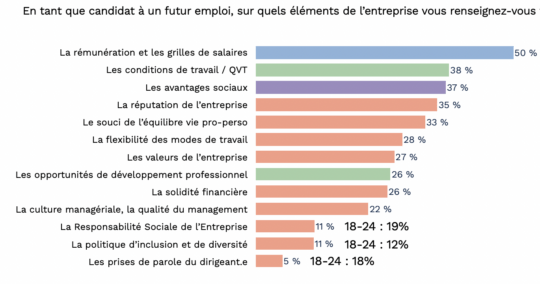What is Employer Brand?
Definition and key elements of employer branding
Employer branding refers to the reputation and perception a company creates as an employer. It encompasses the company’s image, values and culture, as well as the overall experience that current and potential employees have with the organization. In other words, employer branding is the way in which a company presents itself as an employer on the job market.
Key elements of employer branding include transparent communication of company values, corporate culture, professional development opportunities, benefits, and quality of working life. An effective employer branding strategy also involves a positive presence on social media, employee testimonials on rating platforms such as
Glassdoor
awards and recognitions such as the
Great Place To Work label
label, as well as
social and environmental responsibility (CSR) initiatives
.
Impact on talent attraction
The impact of employer branding on talent attraction is significant. A positive employer image attracts qualified and motivated candidates, reducing recruitment costs. Companies that are well perceived as employers also find it easier to retain their existing employees, thereby reducing staff turnover. What’s more, a strong employer brand boosts employee loyalty, improves productivity and helps create a motivating corporate culture.

The benefits of a strong Employer Brand
Competitive advantages of an attractive employer brand
A strong employer brand gives a company many strategic advantages, from attracting talent to retaining employees, enhancing reputation and promoting diversity. Firstly, a strong employer brand attracts quality candidates, reducing recruitment costs and speeding up the hiring process. Beyond salary, which remains the top priority, talents tend to look for companies offering professional development opportunities, good working conditions and attractive benefits, all of which contribute to strengthening the employer brand.
Once talent has been attracted, a strong employer brand facilitates employee retention. Employees are more inclined to stay with a company that values their contribution, offers them development prospects (career, skills) and promotes a fulfilling work environment. This reduces the
staff turnover rate
and helps build a stable, committed team.
What’s more, a positive employer brand strengthens a company’s overall reputation. Customers, business partners and investors are influenced by external perceptions of how a company treats its employees. A solid reputation as an employer can therefore help generate trust and strengthen a company’s credibility in the marketplace.
Strategies to strengthen your Employer Brand
Techniques and approaches to improve the perception of your company
Strengthening your employer brand requires well-thought-out strategies, encompassing communication, corporate culture and employee experience.
The most common strategies include :
- Investment in training and development Our commitment to our employees is demonstrated by the fact that we offer ongoing training and professional development opportunities. This helps create a learning culture and attracts talent eager to advance their careers. 26% of working people consider development opportunities to be a decisive factor in their decision to join a company (WTTJ 2023 barometer).
- Communication on social networks Social media are powerful tools for shaping and disseminating an employer brand. Companies can share employee testimonials, projects and internal events to reinforce their image.
- Candidate and employee experience A positive experience, from the recruitment process right through to integration, helps forge a memorable first impression. Once employed, taking care of their well-being and fulfillment strengthens employee loyalty and commitment.
- Promoting employee benefits For example, it’s now a matter of course to clearly communicate employee benefits, such as health insurance, vacations, company catering and wellness programs. These elements contribute to attracting talents who are looking for complete packages.
- Involving employees in employer branding Encouraging employees to become ambassadors for the employer brand reinforces its authenticity. In fact, co-optation programs are becoming increasingly common within companies. Employee testimonials convey a credible and positive image to candidates, 50% of whom trust them (WTTJ 2023 barometer).
Would you like to improve the quality of life and working conditions within your company to have a positive impact on your employer brand?
Our experienced QWL HR consultants
HR consultants will provide you with pragmatic solutions that meet your employees’ expectations in terms of quality of life, as well as your economic constraints and objectives.
The importance of corporate culture and values
Of course, all these strategies must be in line with the company’s culture and values.
Defining and communicating corporate values is essential today, as candidates and employees want to work for companies that share their values. Clearly articulating the company’s values and communicating them transparently sets it apart. 20% of employees say they’d rather be unemployed than work for a company whose values don’t match their own (
Randstad Brand Research 2023 study
).
Promoting a positive corporate culture is essential to attracting and retaining talent. Encouraging collaboration, diversity, work/life balance and recognition of achievements fosters an attractive work environment. 45% of working people need to work for a company that offers mental health and wellbeing benefits and actively supports equity, inclusion and diversity (Randstad 2023 study).
Integrating current HR trends

How do current trends influence employer branding?
Current trends in the working world, such as teleworking, diversity and inclusion, have a significant influence on how a company is perceived as an employer, and play a crucial role in strengthening the employer brand.
Flexible working, including the possibility of telecommuting or flexible working hours, has become an important expectation for many employees. Companies that successfully integrate this flexibility into their corporate culture enhance their attractiveness. Some companies have even adopted permanent remote working or unlimited vacations, demonstrating their commitment to work-life balance.
Diversity and inclusion are also key elements influencing the employer brand. Talents are looking for work environments where everyone is valued, regardless of their origins, gender, sexual orientation or other characteristics. Some companies stand out for their concrete initiatives to promote diversity, such as setting representation targets and implementing awareness-raising programs.
Inclusion goes beyond mere digital diversity, and involves creating an environment where everyone feels heard and included. Microsoft, for example, has promoted internal programs such as the Neurodiversity at Microsoft initiative to welcome and support neurodivergent employees.
Young people (aged 18-24) are more sensitive than their elders to issues of diversity and inclusion. The company’s CSR policy is a decisive criterion for choosing a company for 19% of them (vs. 11% of total assets) according to the
Welcome to the jungle 2023 employer brand barometer
.
The impact of technology on the Employer Brand
Today, when applying for a job, working people look for information about the company: 36% consult the company’s website, 29% professional social networks such as LinkedIn and 21% consult employee reviews on rating platforms and look at the company’s social networks (welcome to the jungle 2023 employer brand barometer).
The impact of technology and digital platforms on employer branding is therefore considerable, and shapes the way companies interact with talent and cultivate their image on the job market. Social media play a central role, enabling companies to share their corporate culture and success stories, and engage in direct dialogue with potential candidates. Platforms such as LinkedIn, Glassdoor and Indeed provide spaces where current and former employees can share their experiences, directly influencing the external perception of the company.
In addition, recruitment technologies such as ATS (Applicant Tracking Systems) facilitate the recruitment process by automating certain administrative tasks, allowing HR teams to concentrate on human interaction and developing relationships with candidates. Technology is redefining the way companies build and maintain their employer brand, offering powerful tools for communication, engagement, and continuous improvement of the candidate experience.
Conclusion
In a competitive and ever-changing job market, a strong employer branding strategy is essential for companies wishing to attract, retain and motivate top talent. By developing a positive image as an employer, highlighting their corporate culture, values and commitment to employee well-being, companies can stand out in the marketplace and boost their attractiveness. Investing in a strong employer brand is no longer simply an option, but a necessity to ensure company growth.

